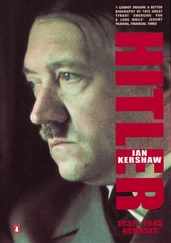By early September reports from propaganda offices across the country were indicating that the mood of the people had reached its lowest point during the entire war. Since the general tenor of such reports—more so than those of the SD—was to emphasize the pro-Nazi sentiments of the population, the clear indication of depression and hopelessness conveyed at this time is all the more striking. A sense of insecurity was widespread. Those with ‘negative’ attitudes were gaining in numbers and undermining morale through defeatist comments and ‘concealed criticism of the leadership’. Many were asking why the Allied landing had not been halted, why total war had not been proclaimed earlier, and why the ‘poison’ that had produced the uprising of 20 July had not been spotted earlier and destroyed. The criticism was aimed at the Führer himself, even if people were too wary to mention him directly.
Those holding such views could see no way to improve the situation and repel the enemy. The wounded soldiers and refugees streaming in from the west only bolstered their pessimism. Ordinary soldiers and the ‘homeland’ were not to blame, they were saying, if it all went wrong and Germany were to lose the war. It was not a matter of fate. The ability of the generals was called into question; and the leadership had not done everything necessary. Above all, the sense of powerlessness in the face of immense enemy superiority in numbers and equipment was dispiriting. Women with children were especially prone to anxiety about the future, it was said. Thoughts of suicide were increasingly common. Hopes in the new weapons were fading, particularly since it was felt that everything had been done too late to make a difference. People were saying that if Lorraine and the Saarland could not be held, the loss of centres of vital armaments production would force Germany to surrender. Few thought that the Westwall —the huge line of German fortifications that had been built in 1938, known to the western Allies as the ‘Siegfried Line’—would hold up the enemy advance any more than the French ‘Maginot Line’ had stopped the Wehrmacht’s march into France in 1940. With the enemy at the borders of the Reich, the desertion of Germany’s allies—Romania had sued for peace and joined the war against Germany on 25 August, Finland was on the verge of breaking off relations with Germany, other countries were about to follow suit—and exposure with no defence to intensified ‘terror from the skies’, it was difficult to avoid pessimism. 12
Refugees from Rombach in Lorraine contributed to a worsening of the mood in factories in the border area with rumours that they had been shot at during their evacuation by train, that enemy parachutists had dropped near Metz, and that the German retreat had been a rout, with officers leaving their soldiers in the lurch as they fled eastwards in whatever vehicles they could find. On top of that, they were saying, the V1 was no longer being fired. Predictably, the report was dismissed in Berlin as mere exaggeration. That did not diminish, however, the damage that was being done by such rumours. 13A similar story was provided to Reichsführer-SS Heinrich Himmler by his friend from schooldays and now head of the SS sanatorium in Hohenlychen, north of Berlin, Professor Karl Gebhardt, during a visit to the western front in early September. The population of Trier, he reported, had been disturbed by the numerous rumours in circulation and by the ‘unpleasant sight’ of Wehrmacht vehicles streaming in from Aachen. The ordered evacuation of Eupen-Malmédy—a former enclave of Belgium, annexed by Germany in 1940—had turned into a panic flight of the German population, in the company of Party functionaries who evidently had no intention of returning. 14
The Party’s evacuation of Aachen (the first major German city in Allied sight) and adjacent areas close to the Westwall on the approach of the Americans had been nothing less than a shambles. Evacuation plans had been laid, and on 11 September Hitler’s approval had been given. The evacuation began around midday on 12 September. It had scarcely begun, however, when, as it seemed amid the start of heavy artillery attacks and repeated air raids that the fall of the city was imminent, panic had broken out among the population. It was impossible, amid gathering chaos, to carry out an ordered evacuation. By mid-evening, some 10,000 frightened civilians were crowded onto Aachen’s stations, desperate to get away but with transport made extremely difficult by the bombs raining down on adjacent tracks. Thousands took matters into their own hands, rushing eastwards from the city on foot in long columns, jamming nearby roads. The Nazi authorities themselves estimated shortly afterwards that some 25,000 had managed to leave between 11 and 13 September, to add to the 20,000 who had left the previous week.
Soon afterwards on the late evening of 12 September, Party officials, Gestapo, police and fire-service joined the panic and fled, leaving the people of the city leaderless. Precisely at this juncture, the divisional staff of the 116th Panzer Division arrived, under the command of General Gerd Graf von Schwerin. In the absence of Party leaders, Schwerin took responsibility on 13 September for restoring order, not least to allow for troop movements. ‘Wild’ evacuation was halted. Citizens were directed into bunkers. Reckoning that the Americans were about to arrive, Schwerin left a note, written in English, informing the commanding officer of the US forces that he had stopped ‘the stupid evacuation’ of the population. At the time there were still between 20,000 and 30,000 people in the city, most of whom were in fact evacuated in the following days.
When German forces, unexpectedly, proved able for the time being to repel the American attack and prevent the occupation, the Nazi authorities seized upon Schwerin’s note, which had come into their hands, to cover their own lamentable failings. The matter was taken as far as Hitler himself. Schwerin was promptly dismissed, and Hitler ordered the utmost radicalism in the defence of the city. An investigation found, however, that Schwerin had acted properly within his responsibilities, and that the failure had plainly lain with the Party authorities. Schwerin was converted in fickle post-war memory into ‘the saviour of Aachen’. In fact, there had been no defiance of orders or humanitarian action on Schwerin’s part. He had undertaken no act of resistance. In crisis conditions he was simply carrying out to the best of his ability what he saw as his duty in line with the military demands of the regime. 15
Goebbels noted ‘extraordinary difficulties’ in the evacuation of the territories close to the Westwall and the population of the border districts being ‘thrown here and there’, but saw this as unavoidable at such a time of crisis. 16A few days later, acknowledging that the situation in Aachen had become ‘critical’, he advocated the principle of ‘scorched earth’ in the question of evacuation. With the future of the nation at stake, little consideration could be given to the people of the area. 17Goebbels was put fully in the picture—if in a scarcely unbiased account—about the ‘desolate situation’ and the evacuation of Aachen by the Gauleiter of Cologne-Aachen, Josef Grohé (whose authority had been badly damaged by the flight of his subordinates). Party and Wehrmacht had stood at loggerheads. The Party had left the city. A general chaos had ensued. ‘Unprecedented scenes’ had taken place on the roads eastwards from Aachen. The situation there and in Trier—whose centre (including the great hall of Emperor Constantine dating from the early fourth century) had been badly damaged by bombs in mid-August, and which in the night of 13/14 September was under sustained artillery attack—had to be regarded as ‘extremely serious’. 18
Читать дальше












